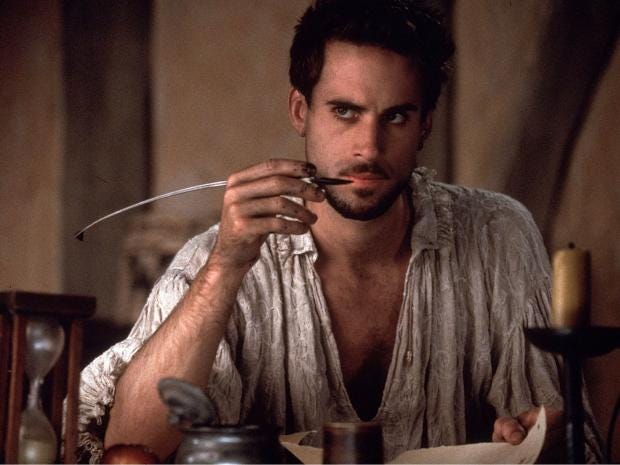
A PERSONAL JOURNAL, KEPT LARGELY TO RECORD REFERENCES TO WRITINGS, MUSIC, POLITICS, ECONOMICS, WORLD HAPPENINGS, PLAYS, FILMS, PAINTINGS, OBJECTS, BUILDINGS, SPORTING EVENTS, FOODS, WINES, PLACES AND/OR PEOPLE.
About Me
- Xerxes
- New Orleans, Louisiana, United States
- Admire John McPhee, Bill Bryson, David Remnick, Thomas Merton, Richard Rohr and James Martin (and most open and curious minds)
30.4.17
29.4.17
28.4.17
27.4.17
26.4.17
24.4.17
Shakespeare
William Shakespeare 400th anniversary: 60 everyday words and phrases you never knew came from the playwright
Ever found yourself hungover after 'too much of a good thing' or been left 'in stitches' at a joke? Shakespeare's influence is still widespread today
|
Click to follow

23 April 2016: the day that marks 400 years since the death of playwright William Shakespeare.
The Bard’s legacy is still strongly felt around the world, with his influence upon the English language showing little sign of relenting.
Even those who never want to hear his name again after studying the tragedies at school must accept that Shakespeare is everywhere. His plays are still widely considered the pinnacle and his mastery of words continues to impress and inspire.
Only recently has Benedict Cumberbatch tackled arguably the most challenging of Shakespeare’s roles, Hamlet, on the London stage, while Michael Fassbender won critical acclaim as Macbeth in last year’s big screen adaptation.
There is an exciting range of events planned up and down the country to commemorate the 400th anniversary this month, from plays and classical concerts to TV specials and historical walks.
William Shakespeare's 400th anniversary stamps
Shakespeare’s impact on our culture is impossible to ignore. Whether you love the likes of Othello and A Midsummer Night’s Dream or insist you “don’t do Shakespeare”, hundreds of phrases coined by his pen are still in wide usage today.
Ever found yourself hungover after “too much of a good thing” or angrily muttering “for goodness sake”? Perhaps a friend has had you “in stitches” after cracking a particularly witty joke, or a noisy neighbour’s party meant you didn’t “sleep one wink”?
It is not always clear whether a word or phrase was already in existence in Shakespeare’s lifetime or if he invented it but regardless, his plays often provide us with the earliest recorded use of many.
If you ever doubt the relevance of Shakespeare in 2016, take a look at these 60 well-used sayings that come courtesy of the Bard:
- “Fancy-free” - A Midsummer Night's Dream
- “Lie low” - Much Ado About Nothing
- “Send packing” - Henry IV
- “Foregone conclusion” - Othello
- “A sorry sight” - Macbeth
- “For goodness sake” - Henry VIII
- “Good riddance” - The Merchant of Venice
- “Neither here not there” - Othello
- “Mum's the word” - Henry VI, Part II
- “What's done is done” - Macbeth
- “Break the ice” - The Taming of the Shrew
- “Scuffle” - Antony and Cleopatra
- “Catch a cold” - Cymbeline
- “Uncomfortable” - Romeo and Juliet
- “Manager” - A Midsummer Night’s Dream
- “Devil incarnate” - Titus Andronicus
- “Dishearten” - Henry V
- “Eventful” - As You Like It
- “New-fangled” - Love’s Labour’s Lost
- “Hot-blooded” - King Lear
- “Eaten out of house and home” - Henry IV, Part II
- “Rant” - Hamlet
- “Knock knock! Who's there?” - Macbeth
- “With bated breath” - The Merchant of Venice
- “Laughable” - The Merchant of Venice
- “Negotiate” - Much Ado About Nothing
- “Jaded” - King Henry VI
- “A wild goose chase” - Romeo and Juliet
- “Assassination” - Macbeth
- “Too much of a good thing” - As You Like It
- “A heart of gold” - Henry V
- “Such stuff as dreams are made on” - The Tempest
- “Fashionable” - Troilus and Cressida
- “Puking” - As You Like It
- “Dead as a doornail” - Henry VI, Part II
- “Not slept one wink” - Cymbeline
- “The world's mine oyster” - The Merry Wives of Windsor
- “Obscene” - Love's Labour's Lost
- “Bedazzled” - The Taming of the Shrew
- “In stitches” - Twelfth Night
- “Addiction” - Othello
- “Faint-hearted” - Henry VI, Part I
- “One fell swoop” - Macbeth
- “Vanish into thin air” - Othello
- “Swagger” - Henry V
- “Own flesh and blood” - Hamlet
- “Zany” - Love's Labour's Lost
- “Give the devil his due” - Henry IV, Part I
- “There's method in my madness” - Hamlet
- “Grovel” - Henry IV
- “Lonely” - Coriolanus
- “Unreal” - Macbeth
- “Salad days” - Antony and Cleopatra
- “Spotless reputation” - Richard II
- “Full circle” - King Lear
- “Epileptic” - King Lear
- “Arch-villain” - Timon of Athens
- “Bloodstained” - Titus Andronicus
- “All of a sudden” - The Taming of the Shrew
- “Come what, come may” - Macbeth
23.4.17
22.4.17
21.4.17
20.4.17
Frank Sinatra
I’ll be honest, for a long time when I thought of Frank Sinatra, I thought of Marilyn Monroe, ratpack films, and the Olive Garden. That is, until I lived for a short time near The Bronx’s Arthur Avenue, the best Little Italy in New York. Sinatra poured from the speakers of Italian eateries and cigar and pastry shops. It dramatically increased the quality of my pleasant associations with his music. Still, I rarely listened very closely. I can’t entirely blame pop culture for turning him into background music—it happens to nearly every major star. But overuse of his voice as accompaniment to olive oil, cigars, and martinis has perhaps made us tune him out too often.
Treating Sinatra as mood music would not have sat well with some of the singers many of us grew up idolizing from a young age, like Paul McCartney and David Bowie, who both found his work formative. McCartney thought so highly of it, he sent Sinatra one of his earliest compositions, an off-kilter lounge crooner called “Suicide” that he wrote at the age of 14. (Hear an unreleased recording below.)
“I thought it was quite a good one,” he remembered, “but apparently [Sinatra] thought I was taking the mickey out of him and he rejected it.”
Bowie, in 1977, wrote what he expressly intended as a parody of Sinatra—“Life on Mars.” But the story is even stranger than that. He specifically tried to “take the mickey” out of Sinatra’s “My Way,” a song credited to Paul Anka that just happens to have first been written, with different lyrics, by Bowie, as “Even a Fool Learns to Love” in 1968 (hear Bowie sing it above). “Life on Mars,” one of the most beautifully melodic songs in all of pop music, with one of Bowie’s best vocal performances, shows how much the Thin White Duke owed to Ole Blue Eyes.
These are just two of hundreds of male singers whose melodies have taken up immortal residence in our brains and who owe a tremendous debt to Frank Sinatra. In addition to his keen melodic sensibility, Sinatra also set a high bar with his technique. In the video at the top of the post from 1965, we see the consummate artist record “It Was a Very Good Year” in the studio, while smoking a cigarette and casually sipping what may be coffee from a paper cup in his other hand.
At one point, he stops and banters with the engineer, asking him to stop for any “P popping,” the explosive sound resulting from singers putting too much force into their “p” sounds and distorting the microphone. Nowadays everyone uses what’s called a “pop filter” to catch these bursts of air, but Sinatra doesn’t have one, or seem to need one. “I don’t thump,” he tells the recording engineer, “I’m a sneaky P popper.” Indeed. One commenter on YouTube pointed out Sinatra’s graceful mic technique:
Notice how he turned his head when he sang “it poured sweet and clear” to avoid the spike on the P. In fact, he backed away from the mic just a bit for that whole last verse because he was singing much stronger for the last statement of the song. Think about it… this was a live studio recording. One take. No overdubs, No added tracks. Just pure talent. The only thing the sound engineers had to do was adjust the eq levels a bit and that’s it. This is what you hear on the album. You’d be hard pressed to find ANYONE who could do that today.
Most vocal performances get recorded in booths, and certainly not in big open rooms with an orchestra and no headphones. Some singers learn to handle a microphone well. Many do not. Audio compression supplies the dynamics, performances get processed digitally and edited together from several takes. Young producers often wonder how people made great sounding records before improvements like pop filters, isolating monitoring systems, or software that allow a nearly infinite number of corrective techniques. The answer: perhaps many of these things aren’t always improvements, but props. As Sinatra shows us in this footage, great sound in the studio came from the professionalism and attentive technique of artists and engineers who got it right at the source.
19.4.17
Louis Amis - President Fracassus
Louis Amis - President Fracassus: Is Donald Trump immune to satire? He must be one of the most widely and fiercely lampooned people of all time; indeed, his entire life can be seen as a one-man war of attrition against the forces of irony. His fortunes are not damaged by it. In fact it’s a war he keeps winning...
18.4.17
Time
The Pursuit of Power by Richard J. Evans. In the late 1800s, time -- and how it was calculated and kept -- changed:
"In the pre-industrial world, time was calculated in relation to the solar noon, which of course occurred at different times according to where one was located on the Earth's surface, and changed everywhere with the passing seasons. Few people had learned to tell the time from looking at clocks, a skill that was not taught in schools even where they existed, and the hour was only a very rough guide to the passage of time; in most rural areas, church bells only tolled for services such as matins and evensong, providing an even more approximate indication of the time of day. The vast majority of people had little need to reckon time accurately to within the minute; often, indeed, clocks only possessed one hand, and the convention of marking the minutes as well as the hours only gained currency gradually. As increasing numbers of men and women migrated to the cities and worked in factories and mines for wages paid by the hour, so timekeeping became more important for employers and employees alike. In 1890 a machine was invented in America that stamped employees' cards with the time they entered the factory and the time they left. 'Clocking on' and 'clocking off' soon became widespread. To avoid being fined for late arrival, workers needed watches. World production of pocket watches, around 400,000 a year in the early nineteenth century, rose to more than 2.5 million a year by 1875. By the turn of the century, the German historian Karl Lamprecht (1856-1915) was claiming that between them the 52 million inhabitants of Germany owned no fewer than 12 million pocket watches.
"In the early nineteenth century, each town or city in Europe kept its own time, setting its watches and clocks without much regard for the hours observed by its neighbours. Early factories still set their clocks by local time, but soon the impulse to standardize time became irresistible, and it was driven above all by the spread of the railways. Even in the mid-1870s, after Germany had been united in a single state, railway timetables within the empire were still forced to base themselves on a bewildering variety of local times that varied from city to city, leaving it up to passengers to convert the time on the local clock to the time on their pocket watch. Railway companies found it necessary to standardize times for their own internal use, and were able to make use of synchronizable electric clocks, invented in 1840 by the Scotsman Alexander Bain (1811-77) and produced in large numbers from the mid-1840s onwards by the German clockmaker Matthias Hipp (1813-93). In Britain the Irish Mail train leaving Euston Station in London every morning carried an Admiralty messenger with a watch giving the correct London time, passing it on to officials on the Irish steam-packet at Holyhead to take to Dublin, and receiving it from them on the way back to return to London. By 1855, however, virtually all public clocks in the United Kingdom were set by Greenwich Mean Time, well before they were forced to do so by law
twenty-five years later, largely following the initiative of railway companies that decided it was too complicated to take local times into account.
"In Britain many station clocks continued to have two minute-hands up to the end of the century and sometimes beyond, one showing Greenwich time and the other the traditional local time. Belgium and the Netherlands did not introduce a standard time until 1892, Austria-Hungary and Italy until 1893. The French railways, recognizing the centrality of Paris to their system, had standardized their timetables according to Paris time, but although an 1891 law made this legally binding for the whole of France, the railways fixed their station clocks five minutes behind this so that passengers would have time to board their train, while time on the tracks remained fixed at the national standard. In Germany it was not the railway companies or other economic pressure groups that proved the most powerful advocates of standard time, but the Prussian Field Marshal Helmuth von Moltke. He had already used railways to good effect in the wars of German unification to move troops rapidly across the land, and saw the continuing chaos of variable time zones as a major obstacle to military efficiency in the future. In the early 1890s he complained that 'we have in Germany five zones, a ruin that has remained standing out of the once-splintered condition of Germany, but which, since we have become an empire, it is proper to abolish'. Accepting the primacy of the Greenwich meridian, and advocating a national standard time based on the 15th meridian, just east of Berlin, Moltke went on to declare that what was needed was 'a unity of time reckoning for the whole of Germany'. It came eventually in 1893.
"The need to standardize time had already become urgent with the spread of telegraphing systems across not only Europe but also the world. The first submarine cables were laid across the English Channel in the early 1850s, and already in 1852, Edward Highton (1817-59), a pioneer of the electromagnetic telegraph, commented: 'Time and space are all but annihilated. Years are converted into days, days into seconds, and miles have become mere fractions of an inch.' It was not until 1865 that the Great Eastern, then the largest ship in the world, succeeded in laying a cable across the Atlantic Ocean. A frenzy of cable-laying followed, and by 1871 punters in Calcutta could learn the result of the Derby no more than five minutes after the famous horse race was over. The scale of the British Empire and the dominance of British industry ensured that in 1890 nearly two-thirds of the telegraph lines in the world were owned by British companies, which controlled 97,000 miles of cables. But the influence of the system extended far beyond the British Empire. The growth of the new global communication networks meant, as the Hungarian writer Max Nordau (1849-1923) noted in 1892, that the simplest villager now had a wider geographical horizon than a head of government a century before."
17.4.17
Never Stop Learning
Lifelong learning is the “ongoing, voluntary, and self-motivated” pursuit of knowledge for either personal or professional reasons. The pursuit of knowledge is easier than it has ever been before.
Cultivating the mind is essential for your personal growth. Digging deeper will separate you from the crowd and allow you to become a better version of yourself.
If you have ever wondered what you can do to become a well-rounded person and increase your rate of success, you will find these books useful. If you are constantly striving to know, learn and do more, these books will give you an edge in life.
1. The practical and inspiring ways for you to become more successful through better thinking
The 5 Elements of Effective Thinking by Edward B. Burger
“Fail nine times The next time you face a daunting challenge, think to yourself, “In order for me to resolve this issue, I will have to fail nine times, but on the tenth attempt, I will be successful.” This attitude frees you and allows you to think creatively without fear of failure, because you understand that learning from failure is a forward step toward success.
Take a risk and when you fail, no longer think, “Oh, no, what a frustrating waste of time and effort,” but instead extract a new insight from that misstep and correctly think, “Great: one down, nine to go — I’m making forward progress!” And indeed you are. After your first failure, think, “Terrific, I’m 10% done!” Mistakes, loss, and failure are all flashing lights clearly pointing the way to deeper understanding and creative solutions.”
2. The tools to unleash the secret of peak performance
Flow: The Psychology of Optimal Experience, by Mihaly Csikszentmihalyi
“Contrary to what we usually believe, moments like these, the best moments in our lives, are not the passive, receptive, relaxing times — although such experiences can also be enjoyable, if we have worked hard to attain them. The best moments usually occur when a person’s body or mind is stretched to its limits in a voluntary effort to accomplish something difficult and worthwhile.
Optimal experience is thus something that we make happen. For a child, it could be placing with trembling fingers the last blockon a tower she has built, higher than any she has built so far; for a swimmer, it could be trying to beat his own record; for a violinist, mastering an intricate musical passage. For each person there are thousands of opportunities, challenges to expand ourselves.”
3. An exploration of how extreme athletes break the limits of ultimate human performance
“If we are hunting the highest version of ourselves, then we need to turn work into play and not the other way round. Unless we invert this equation, much of our capacity for intrinsic motivation starts to shut down. We lose touch with our passion and become less than what we could be and that feeling never really goes away.”
“To really achieve anything, you have to be able to tolerate and enjoy risk. It has to become a challenge to look forward to. In all fields, to make exceptional discoveries you need risk — you’re just never going to have a breakthrough without it.”
4. An unconventional book of inspiration and wisdom for achieving a fulfilling life
How Will You Measure Your Life? by Clayton M. Christensen
“In your life, there are going to be constant demands for your time and attention. How are you going to decide which of those demands gets resources? The trap many people fall into is to allocate their time to whoever screams loudest, and their talent to whatever offers them the fastest reward. That’s a dangerous way to build a strategy.”
“In order to really find happiness, you need to continue looking for opportunities that you believe are meaningful, in which you will be able to learn new things, to succeed, and be given more and more responsibility to shoulder.”
5. A set of powerful practices to help break the cycle of unhappiness, stress, anxiety and mental exhaustion
“Pure awareness transcends thinking. It allows you to step outside the chattering negative self-talk and your reactive impulses and emotions. It allows you to look at the world once again with open eyes. And when you do so, a sense of wonder and quiet contentment begins to reappear in your life.”
“Gradually, moment by moment, you may have come to realize that although you can’t stop the unsettling thoughts from arising in your mind, you can stop what happens next. You can stop the vicious circle from feeding off itself.
6. The KonMari approach to tidying and decluttering
The Life-Changing Magic of Tidying Up: The Japanese Art of Decluttering and Organizing by Marie Kondō
“The question of what you want to own is actually the question of how you want to live your life.”
“Keep only those things that speak to your heart. Then take the plunge and discard all the rest. By doing this, you can reset your life and embark on a new lifestyle.”
“The process of assessing how you feel about the things you own, identifying those that have fulfilled their purpose, expressing your gratitude, and bidding them farewell, is really about examining your inner self, a rite of passage to a new life.
7. Mark shows you how to stop trying to be “positive” all the time so that you can truly become better and happier
The Subtle Art of Not Giving a F*ck: A Counterintuitive Approach to Living a Good Life by Mark Manson
Everything worthwhile in life is won through surmounting the associated negative experience. Any attempt to escape the negative, to avoid it or quash it or silence it, only backfires. The avoidance of suffering is a form of suffering. The avoidance of struggle is a struggle. The denial of failure is a failure. Hiding what is shameful is itself a form of shame.
Pain is an inextricable thread in the fabric of life, and to tear it out is not only impossible, but destructive: attempting to tear it out unravels everything else with it. To try to avoid pain is to give too many fucks about pain. In contrast, if you’re able to not give a fuck about the pain, you become unstoppable.
8. This book unveils the principle of “Massive Action,”
The 10X Rule by Grant Cardone
As long as you are alive, you will either live to accomplish your own goals and dreams or be used as a resource to accomplish someone else’s.
Until you become completely obsessed with your mission, no one will take you seriously. Until the world understands that you’re not going away — that you are 100 percent committed and have complete and utter conviction and will persist in pursuing your project — you will not get the attention you need and the support you want.
I suggest that you become obsessed about the things you want; otherwise, you are going to spend a lifetime being obsessed with making up excuses as to why you didn’t get the life you wanted.
9. The importance of living your life with purpose
The 7 Habits of Highly Successful People by Stephen Covey
“But until a person can say deeply and honestly, “I am what I am today because of the choices I made yesterday,” that person cannot say, “I choose otherwise.”
“Most people do not listen with the intent to understand; they listen with the intent to reply.”
“Treat a man as he is and he will remain as he is. Treat a man as he can and should be and
he will become as he can and should be.”
Subscribe to:
Posts (Atom)


/public-media.smithsonianmag.com/filer/bb/c3/bbc3913f-9140-48f4-b662-30fa57bca891/http-sirismmsiedu-naa-97-middle_east-04020400-wr.jpg)












